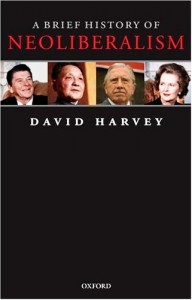 The Marxist Thinker Karl Polanyi’s conception of ‘good and bad’ freedoms offers a useful starting point for criticising the recent tory cuts.
The Marxist Thinker Karl Polanyi’s conception of ‘good and bad’ freedoms offers a useful starting point for criticising the recent tory cuts.
Below is a lengthy ammended passage from David Harvey’s ‘a brief history of neo-liberalism’. I was going to wait and publish the whole summary once I’d finished it (obviously within copyright limitations!) but I read this on the train this morning and it was just so pertinent I had to upload it asap!
Karl Polanyi in 1944 pointed out that in a complex society the meaning of freedom becomes contradictory. There are, he noted, two types of freedom, one good the other bad. Among the ‘ bad freedoms’ he listed ‘the freedom to exploit ones fellows, or the freedom to make inordinate gains without commensurable service to the community, the freedom to keep technological inventions from being used for public benefit or the freedom to profit from public calamities secretly engineered for private advantage. Polanyi argues that all of these types of freedom throve under a competitive market (capitalist) economy. However, this same capitalist system that is responsible for these ‘evil freedoms’ also gives rise to ‘god freedoms’ that most of us cherish – such as Freedom of speech, freedom of meeting, freedom to choose one’s own job.
According to Polanyi we need greater regulation of the market in order to achieve a greater amount of ‘good freedoms’ for the majority. We need, for example to restrict those types of freedom such as ‘the freedom to make gains from others without giving a commensurable service back to the community’ and this should result. In Polanyi’s own words…
‘The passing of the market economy can become the beginning of an era of unprecedented freedom. Judicial and actual freedom can be made wider and more general than ever before; regulation and control can achieve freedom not only for the few, but for all… Industrial society can afford to be both just and free.’
Unfortunately, Polanyi noted, the passage to such a future is blocked by the ‘moral obstacle’ of liberal utopianism (read ‘neo-liberalism) in which…
‘Planning and control are being attacked as a denial of freedom. Free enterprise and private ownership are declared to be essentials of freedom. No society built on other foundations is said to deserve to be called free. The freedom that regulation creates is denounced as unfreedom; the justice, liberty and welfare it offers are decried as a camouflage of slavery. ‘
The idea of freedom ‘thus degenerates into a mere advocacy of free enterprise. This means a mere pittance of liberty for the people, who may in vain attempt to make use of their democratic rights to gain shelter from the power of the owners of property.’ But if, as is always the case, ‘no society is possible in which power and compulsion are absent, nor a world in which force has no function, then the only way this liberal utopian vision could be sustained is by force, violence and authoritarianism. Liberal or neoliberal utopianism is doomed, in Polanyi’s view, to be frustrated by authoritarianism, or even outright fascism. The good freedoms are lost, the bad ones take over.

Polanyi’s analysis appears particularly relevant today given the following
- 1. America has persistently used military force, both covertly and overtly, to install neo-liberal states which protect the property and profit rights of the wealthy while stamping on the rights of the majority to basic public services, freedom of expression and association. Read Naomi Klein’s Shock Doctrine, for the evidence.
- 2. Many Corporations have profited from natural disasters and war – Halliburton and Blackwater being the most obvious.
- 3. You might also want to look up how Goldman Sachs is profiting from dealing in basic food supplies, pushing prices up. Sachs profits, while people in the developing world starve. Will post on this rather complex issue later.
This is a great moral and philosophical tradition from which to argue against the Tory Cuts – by cutting Corporation Tax and encouraging them to use tax havens, the Tories are allowing the elite class to have even more freedom, but by cutting public services and hassling 12 year olds that want to protest, they then limit the freedom of expression of the majority.
The argument we should be making against the Tory cuts is that there is a direct relationship between the elite class having too much of the wrong kind of freedom – these are the freedoms which cause social problems.
TORYS – IF YOU WANT THE PROTESTS TO STOP YOU NEED TO LIMIT THE EVIL FREEDOMS OF THE FEW – THE FREEDOMS WHICH HURT THE MAJORITY